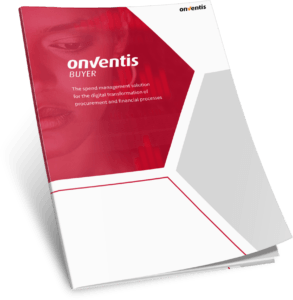Effective supplier management: Everything you need to know about supplier management
Supplier management represents the systematic control of supplier relationships. It involves intensifying and promoting cooperation with the right partners to make the process transparent and sustainable. The most important components of supplier management include the selection, qualification, classification, evaluation and development of suppliers.
E-procurement systems represent the digital platform that enables the networking of buyers and suppliers. Procurement organisations can thereby coordinate their supplier relationships, while all supplier-related data is managed digitally and centrally.

What is Supplier Management?
Supplier management (also known as vendor management) is the systematic management of supplier relationships. This involves intensifying and promoting cooperation with suitable partners in order to make it transparent and sustainable. The most important components of supplier management include the selection, qualification, classification, evaluation and development of suppliers.
E-procurement systems are digital platforms that enable networking between buyers and suppliers. Purchasing organizations can use the platform to maintain existing supplier relationships by managing all supplier-related data centrally.
The key objectives of supplier management
Supplier management involves both strategic and operational tasks.
Strategic supplier management refers to the process of identifying, evaluating and selecting suppliers that meet the company’s requirements. The focus is on developing the relationship with the supplier to minimise a company’s risks and strengthen the supply chain. The primary concern here is to ensure supply in the short, medium and long term. This also includes the expansion and development of a diversified supplier base to reduce dependencies on certain suppliers and delivery delays.
The operational focus of supplier management deals with the daily activities of a buyer. Here, smooth cooperation with suppliers is ensured by implementing the previously defined procurement and supplier management strategy. The most important tasks include order processing, supplier communication and problem-solving in the event of supply disruptions. Increased efficiency in the procurement process can be achieved through operational supplier management, which influences cost savings. Thus, operational supplier management aims to continuously improve the procurement processes.
The path to supplier success: The indispensable components of effective supplier management
The supplier management process can be broken down into five components: Supplier selection, qualification, classification, evaluation and supplier development. Each element is interconnected and thus reliant on one another, influencing and enabling seamless supplier management.
Supplier selection
Supplier selection is based on the previously defined five components. Before selection, various factors that are influenced by the individual process steps must be considered. Important evaluation criteria should be observed to assess the performance of potential suppliers. Do they meet my requirements? What is the risk of working with certain suppliers? What certificates or other quality management systems are available? In the course of a supplier qualification, required data can be collected simply and easily through e-procurement systems, which are fundamental for the selection.
Supplier qualification
Supplier qualification aims to screen potential or existing suppliers for their suitability to meet a company’s requirements. This process considers various factors such as financial stability, experience and competence, capacity to meet requirements, quality assurance processes and compliance with environmental and social standards. A formal review of documentation and certificates is often part of the qualification phase to ensure that only reliable and qualified suppliers that meet the company’s guidelines are selected.
E-procurement or supplier relationship management (SRM) systems represent the digital interface between suppliers and purchasing organisations. This enables buyers to complete the supplier qualification process digitally: Buyers can receive and verify all crucial information by means of customized self-assessments completed by suppliers and transmitted digitally. All information about necessary certificates, guidelines and mandatory criteria is collected centrally on one platform and can thus be automatically assessed and evaluated on an ongoing basis.
Supplier classification
After the qualification, selected suppliers are classified. The process of dividing suppliers into different categories helps to improve and simplify management and control. The basis for this classification is the information gathered during the qualification process, typically based on criteria pertaining to risk and performance evaluation. This enables companies to segment their suppliers and prioritize the most important ones. By doing so, suppliers with higher risk levels (such as those with financial issues or compliance violations) can be closely monitored, while alternative suppliers can be identified if needed.
Supplier classification can be conducted automatically by SRM systems according to defined criteria. Adjustments of the categorization is also automated, and the suppliers are graded by the system, if they no longer meet the requirements. As an example, in case of an expired certificate, the system will reclassify the supplier until they provide valid documents. If the services comply with the company’s standards again, the system will update the classification accordingly. This allows the buyer to stay up-to-date on suppliers that pose high or low risks and ensures that only qualified suppliers are engaged.
Supplier evaluation and rating
The supplier evaluation process serves to strengthen the relationship with the supplier and to define targeted measures for supplier development. Various evaluation criteria are collected, which provide a basis for optimising the supplier relationship. To determine objective performance metrics, internal questionnaires serve as a source of information. These questionnaires measure hard facts such as delivery punctuality, delivery time, price, and product quality, which can be quantified and objectively evaluated.
In addition, soft facts are collected that characterise subjective and difficult-to-measure criteria which include the supplier’s flexibility, innovative ability, communication with the company and sustainability aspects. In order to obtain a complete picture of the suppliers, company information from third-party systems is also processed and used in the form of sustainability ratings.
The combination of business information and other relevant risk management assessments can strengthen the relationship with suppliers. Supplier development plays a crucial role here by specifically improving the supplier’s capabilities and performance in order to ensure its suitability as a long-term business partner and to optimise cooperation. Supplier assessment and development thus serve not only to optimise the supplier relationship, but also to ensure the quality and efficiency of the supply chain in the long term.
Why modern supplier management is indispensable
Supplier management is not only essential for the procurement process, but also for the stability of the supply chain. In the face of rising geopolitical challenges and volatile markets, transparent collaboration with qualified and sustainable business partners within the supply chain becomes imperative.
In addition, the growing reliance of the value chain on supplier services highlights the increasing importance of supplier management. As more and more important processes are being transferred to suppliers, the share of external services is growing. In order to minimise supply risks, targeted supplier management is essential. By comparing suppliers transparently, buyers can stabilise their supply chain and utilise optimisation potential in a targeted manner.
E-procurement systems play a central role here. They provide an effective exchange platform between buyers and suppliers and enable an easier exchange of information. A solid digital infrastructure is thus an important foundation for successful supplier management. By using digital supplier management systems, buyers can better understand their suppliers and build effective relationships. E-procurement systems represent the central communication tool to promote simple and effective exchanges. Companies can build up a reliable supplier base through substantiated analyses and evaluations of their suppliers, which support in strategic decision making without being exposed to the risks of supplier selection.
Weitere BlogsMore BlogsMeer blogs




